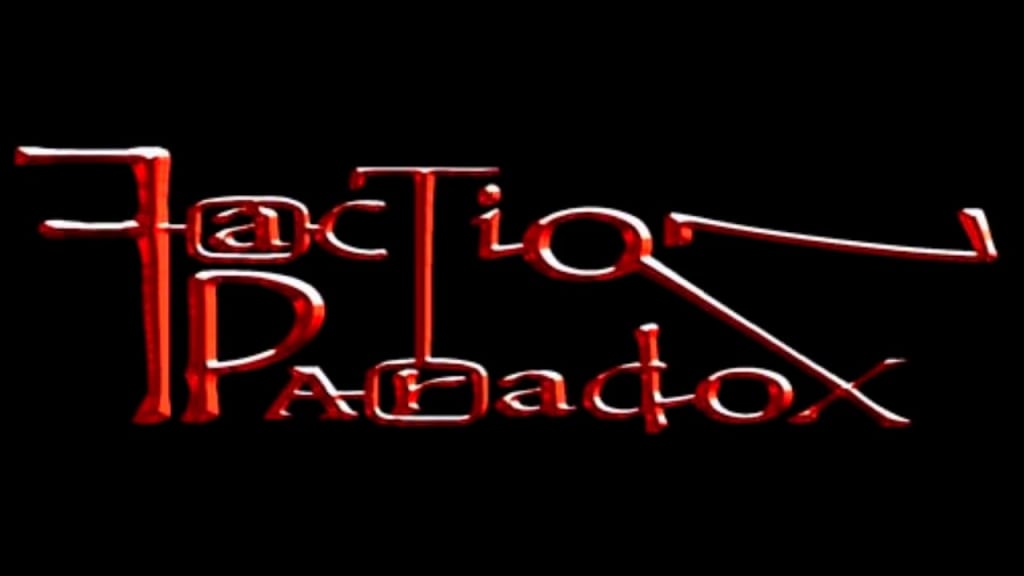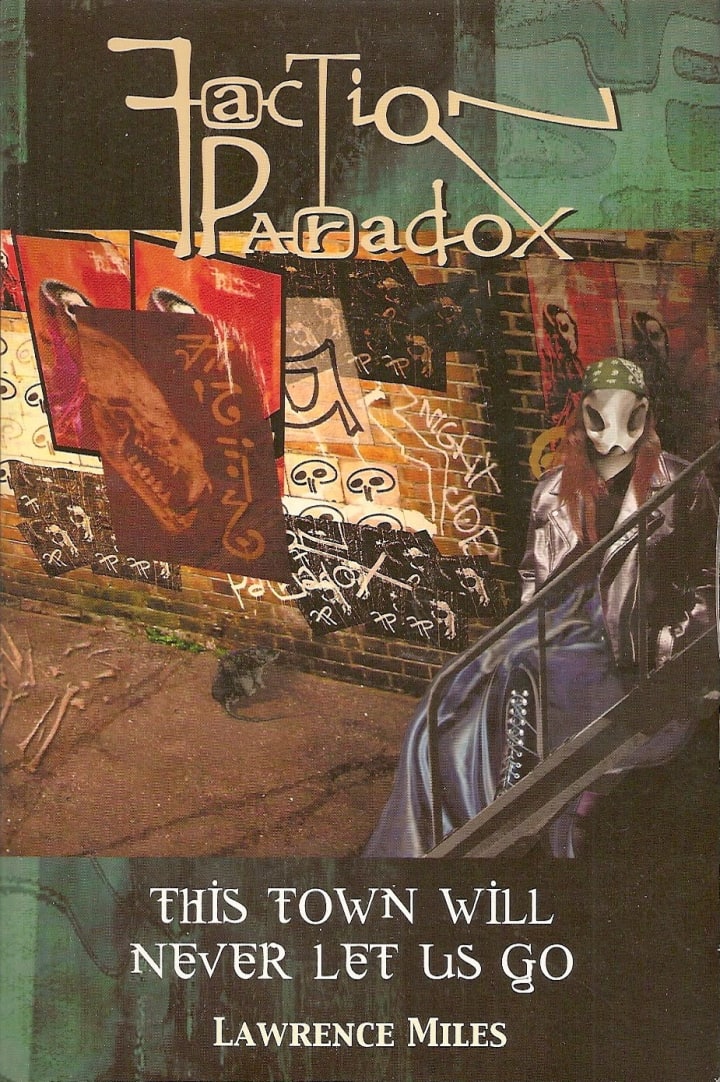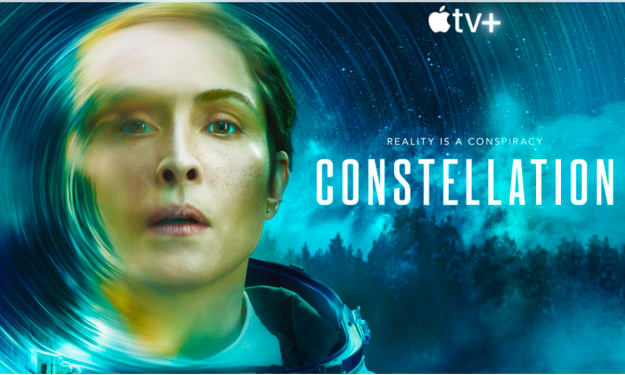Review - 'Faction Paradox: This Town Will Never Let Us Go'
Let's talk about possibly the greatest 'Doctor Who' spin-off novel you've never heard of, let alone read.

Nearly a decade ago, I attended a panel at the Chicago TARDIS convention on the topic of the novels of the wilderness years of Doctor Who (i.e. that time period between 1989 and 2005 when there was no TV show airing). On the panel were convention guests who had contributed to those books: Jonathan Blum, Paul Cornell, Kate Orman, and Gary Russell. Perhaps it was inevitable that the topic of Lawrence Miles, that looming but an immensely controversial author of the era, came up as the proverbial "elephant in the room." Despite Miles attacking them all in interviews, all four had great things to say about his work and it was Cornell who said that Miles, "should have been the next great British science fiction writer." In reading this, Miles' last published novel (which I bought at the same convention six years later), I can't help but feel he was right in that assessment.

Technically, This Town Will Never Let Us Go was meant to be the opening standalone Faction Paradox novel from Mad Norwegian Press. Considering that, it feels like an odd book indeed. The faction, a sort of time traveling voodoo cult obsessed with paradoxes, hardly features in the novel at all, mainly through little references here and there. Indeed all the things one would have expected from Miles previous set-up in Doctor Who novels like Alien Bodies barely comes into play at all. It's a strange way to kick-off a series to say the least.
Or at least one might think that. Instead of what the reader was likely expecting, Miles instead spends 281 pages following a trio of characters across six hours one morning, the novel presents us with a human eye view of that conflict known simply as The War. We meet Inangela, a Goth girl living in a van determined to join the ranks of the Faction by engaging in a ritual across the titular town. There's Valentine, an ambulance driver who has decided to make his own way into The War. Last but not least is Tiffany, a Latina Britney Spears type who goes on a journey of self-discovery right into the heart of modern media. These three apparently disconnected protagonists eventually converge in the plot's last couple of hours but that isn't what's most surprising about the novel.
That would be the fact that Miles does what all great science fiction does. He takes this human eye view of The War and engages in an almighty critique of British society and Western culture in the aftermath of 9/11. The War becomes a metaphor for the War on Terror and Valentine's subplot becomes an all too familiar story of radicalization that wouldn't be out of place in headlines fifteen years or more after the novel was first published. Miles is also keen to take shots at the media, advertising, and pop culture in general as he finds symbolism and banality side by side in places. Despite it being "the most 2003 book imaginable" (to paraphrase and indeed correct Miles in the last interview I'm aware of that he did in 2013), it's also a remarkably prescient book as he discusses the spread of information and ideas, knee-jerk reactions, and cults of personality around celebrities that doesn't feel at all out of place in the age of Twitter and social media. What's remarkable is that Miles does all that is what is really a novel meant to be aimed at a niche within a niche (Doctor Who fans who not only read his previous BBC novels but also wanted more of Faction Paradox in print) and tells a compelling story along the way.
It's compelling in large part because of how Miles chooses to tell his story. The novel unfolds minute by minute, hour by hour in the unnamed town that seems to have more than a few similarities with London. The novel is full of asides worthy of Douglas Adams and an almost obsessive eye towards the mythological dimensions underpinning behind ordinary things that would not be out of place in one of Neil Gaiman's novels from Neverwhere to American Gods. Indeed, reading this made me understand some of Miles' animosity towards Gaiman that he has expressed on his blog. They're both British writers (though Gaiman spends a lot of time in the US these days) who deal in similar territories at times. Miles is what Gaiman (and perhaps even the aforementioned late Mr. Adams) would be if they were cynical to the extreme. The cynicism and the at times borderline pretentious literary style (along with the small print of the physical edition I read) makes reading the novel difficult at times. It's a novel overflowing with ideas and insights (as painful and difficult to swallow as they are at times) but well worth making it through.
Perhaps the biggest problem the novel has is that it is, ultimately, meant to be a Doctor Who spin-off novel. It's the fact that it is aimed at the aforementioned niche within a niche that made its audience so small. This Town Will Never Let Us Go is a remarkable, breathtaking, even uncomfortably getting under your skin piece of work. It should have been the start of something new, maybe a way of bringing Faction Paradox and its creator to a wider audience.
Instead, it's a footnote. One of many Doctor Who spin-off novels out there at the moment. Miles said in the aforementioned 2013 podcast interview that he has all but given up writing at this point and indeed this novel is his latest published novel as of writing this in early 2018. All of which makes me sad because This Town Will Never Let Us Go ought to be screamed about from the rooftops and Miles ought to be winning prizes. Instead one is out of print (though still obtainable at reasonable prices) and the other has given up writing.
Neither of which feels right.
About the Creator
Matthew Kresal
Matthew Kresal was born and raised in North Alabama though he never developed a Southern accent. His essays have been featured in numerous books and his first novel Our Man on the Hill was published by Sea Lion Press in 2021.






Comments
There are no comments for this story
Be the first to respond and start the conversation.